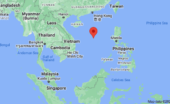Re Ian Bremmer 'Could third-party candidates upend the 2024 US election?' 3 April The current political movement in the USA…
Wednesday Night #1917 with Brett House and Peter Berezin
Written by Diana Thebaud Nicholson // December 5, 2018 // Wednesday Nights // Comments Off on Wednesday Night #1917 with Brett House and Peter Berezin
Wednesday’s funeral services for George H. W. Bush (Bush #41) may dominate the news, but with the very welcome return of our dear friend, Brett House, Scotiabank’s VP & Deputy Chief Economist and Peter Berezin of BCA, this Wednesday Night is all about the global economy.
The G20 will certainly be on the agenda, but for side events, as little of import was achieved by the meeting as a whole (see below) .
Last Friday, the new Nafta – known in Canada as CUSMA – was signed in Buenos Aires. None of the signatories looked particularly happy, As Brett has written in a recent report, “Canada and Mexico have still not received an exemption from US tariffs on steel and aluminum products as the US presses for binding quotas that would cut imports from the two countries. Talks will continue and we expect that these tariffs will be lifted prior to the formal ratification of CUSMA in both countries.” And the road to ratification by Congress is littered with potholes.
Of greater importance to global trade was the Trump-Xi working dinner on Saturday at which they attempted to resolve the on-rushing trade war. As reported in the NYT, the resultant temporary truce, loudly proclaimed as a victory by Trump, “does little to resolve the deep differences between the two nations and is more a political agreement than a substantive one. Both sides immediately positioned the cease-fire as a domestic victory while staking out areas where they would not compromise.” There is no indication of any resolution of the concerns expressed by Ryan Hass in Trade deal or not, the long-range prospects for US-China relations are growing more troubling As long as competition is undertaken within mutually understood parameters, it need not be destabilizing. Those parameters do not currently exist, and as a consequence, there is growing risk of mutual miscalculation leading to unintended escalation.
Brett has written that “The tariff truce reportedly agreed between Presidents Trump and Xi is a fresh sign that the White House wants to kick the imposition of further tariffs down the road and find an off-ramp from its trade dispute with Beijing.” However, Trump has somewhat upended that analysis with Tuesday’s proclamation “President Xi and I want this deal to happen, and it probably will,” Trump wrote on Twitter. “But if not remember, I am a Tariff Man. When people or countries come in to raid the great wealth of our Nation, I want them to pay for the privilege of doing so. It will always be the best way to max out our economic power.”
Peter’s recent 2019 Outlook is not optimistic. “Rising geopolitical tensions in the Sino-American relationship has been our premier geopolitical risk since 2012. The Trump
administration has begun tying geopolitical and strategic matters in with the trade talks. No longer is the White House merely asking for a narrowing of the trade deficit, improved intellectual property protections, and the removal of non-tariff barriers to trade. Now, everything from surface-to-air missiles in the South China Sea to Beijing’s “Belt and Road” project are on the list of U.S. demands. We would therefore downplay any optimistic news from the G20 summit between Presidents Trump and Xi. President Trump could freeze tariffs at current rates and allow for a more serious negotiating round throughout 2019.
But unless China is willing to kowtow to America, a fundamental deal will remain elusive in the end. For Trump, a failure to agree is still a win domestically, as the median American voter is not asking for
a resolution of the trade war with China.” He will no doubt have more to say about other aspects of the global economy as he argues that “Today’s macroeconomic backdrop of slowing global growth, plunging oil prices, falling equity prices, widening credit spreads, and a strong dollar is reminiscent of what transpired in 2015.”
In A trio of unrepentant global disruptors leaves its mark on G20 summit, Mark MacKinnon comments: “This is what success looks like these days for a major multinational institution: The G20 summit in Argentina ended on Saturday with exhalations of relief simply because no one walked away from the meeting, and a joint communiqué was signed by everyone.” One footnote that seems to have been largely ignored by the media: At the end of the meeting, it was confirmed Saudi Arabia would host the 2020 summit. Ironic, given that MBS was identified as one of the disruptors.
Maybe the world is hoping that MBS will have magically (or not) disappeared from the world scene by 2020? The latest news of the US Senate reaction to the briefing on the Khashoggi murder (Republicans rage at ‘guilty’ Saudi crown prince) would indicate that the distinguished body would happily see him incarcerated, however, they have no say. Good commentary from Larry Haas and Jeremy Kinsman
The situation in Europe is not good. With Merkel’s departure, Macron’s domestic problems and Theresa May’s Brexit difficulties, it is hard to be optimistic. Reuters notes that on top of the risk that Britain will leave the EU in March without a transition deal, its government faces an extra headache next year: the biggest debt-refinancing bill in recent history.
The Katowice Climate Change Conference opened on Sunday in the heart of Poland’s coal country. Sir David Attenborough, who spoke at the opening ceremony, is taking up the “People’s Seat” at the conference, and will act as a link between the public and policy-makers at the meeting. Also speaking, former California Governor Arnold Schwarzenegger underlined that the 2015 Paris Agreement has widespread support at the local and state levels even if the U.S. federal government isn’t on board, and American states, cities, businesses and citizens can do a lot to curb global warming. (more on Climate change, uncertainty & security 2017 – 2018)
A relevant interview with Chris Ragan, of McGill University and chair of Canada’s Ecofiscal Commission — a non-partisan group of economists working to find FISCAL solutions to environmental problems in which he explains why he is convinced that the federal government’s carbon pricing policy is a smart package that will both reduce greenhouse gas (GHG) emissions and maintain most families’ purchasing power. But, he warns, the government has to carefully explain how both parts of the policy actually make sense.
Meanwhile in Canada
After announcing the 8.7% cut in Alberta’s oil production on Sunday, Rachel Notley has asked that issues facing the oilpatch be on the agenda of Friday‘s first ministers conference. So far, there is no indication that they will be addressed other than via agenda items like job creation, trade diversification and competitiveness.
In the wake of the news of the closing of the GM plant in Ottawa, Andrew Coyne reminds us GM’s lesson on subsidies — the jobs last only as long as the money does – The only assurance a company will stay is if it makes economic sense. If not, then all you have won with your subsidy is the right to go on providing more subsidy It is worth noting the subtle reference to the federal government’s $595-million package to help Canada’s media – “subsidy arguably makes the eventual demise of those jobs more rather than less likely, so far as it blinds business to the reality of its situation or encourages it to avoid the sorts of hard decisions needed to put it right: a pattern I fear my own industry is about to repeat.”
In case you were busy watching something else, the StatCan bank data harvest plan is now on hold and the news is out that Statistics Canada failed to disclose key info about the project to the privacy commissioner, who is justifiably unhappy.



